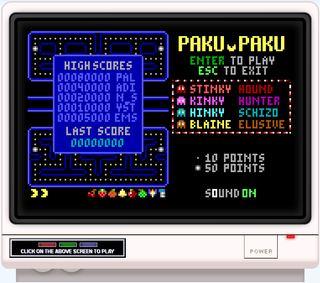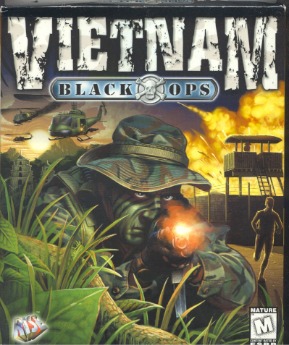
Amiga is a family of personal computers produced by Commodore from 1985 until the company's bankruptcy in 1994, with production by others afterward. The original model is one of a number of mid-1980s computers with 16-bit or 16/32-bit processors, 256 KB or more of RAM, mouse-based GUIs, and significantly improved graphics and audio compared to previous 8-bit systems. These include the Atari ST—released earlier the same year—as well as the Macintosh and Acorn Archimedes. The Amiga differs from its contemporaries through custom hardware to accelerate graphics and sound, including sprites, a blitter, and four channels of sample-based audio. It runs a pre-emptive multitasking operating system called AmigaOS.

A computer mouse is a hand-held pointing device that detects two-dimensional motion relative to a surface. This motion is typically translated into the motion of the pointer on a display, which allows a smooth control of the graphical user interface of a computer.

Broderbund Software, Inc. was an American maker of video games, educational software, and productivity tools. Broderbund is best known for the 8-bit video game hits Choplifter, Lode Runner, Karateka, and Prince of Persia, as well as The Print Shop—originally for printing signs and banners on dot matrix printers—and the Myst and Carmen Sandiego games. The company was founded in Eugene, Oregon, and moved to San Rafael, California, then later to Novato, California. Broderbund was purchased by SoftKey in 1998.

THQ Inc. was an American video game company based in Agoura Hills, California. It was founded in April 1990 by Jack Friedman, originally in Calabasas, and became a public company the following year through a reverse merger takeover. Initially working in the toy business, it expanded into the video game business through several acquisitions before shifting its focus away from toys entirely. THQ continued its trend of acquiring companies throughout the 2000s.
NovaLogic, Inc. was an American software developer and publisher established in 1985 and based in Calabasas, California. The company was founded by CEO John A. Garcia. Garcia's background in computer software started in Southern California in the early 1980s, when he worked at Datasoft. The company was known for their Voxel Space engine, which was utilized in franchises such as the Comanche and Delta Force series. In October 2016, NovaLogic's assets were bought out by THQ Nordic who are not currently using the label.

Softdisk was a software and Internet company based in Shreveport, Louisiana. Founded in 1981, its original products were disk magazines. It was affiliated and partly owned by paper magazine Softalk at founding, but survived its demise.

A personal computer game, also known as a computer game or abbreviated PC game, is a video game played on a personal computer (PC). The term PC game has been popularly used since the 1990s referring specifically to games on "Wintel" which has dominated the computer industry since.
Sunstorm Interactive was an American video game developer founded in 1995 by Anthony Campiti, which specialized in hunting simulators and first-person shooters. The majority of their titles were small-scale "value titles", priced between $20 and $30 as compared to the typical computer game that was priced at $50 at the time.
Microsoft Plus! is a discontinued commercial operating system enhancement product by Microsoft. The last edition is the Plus! SuperPack, which includes an assortment of screensavers, themes, and games, as well as multimedia applications. The Microsoft Plus! product was first announced on January 31, 1994, under the internal codename "Frosting". The first edition was an enhancement for Windows 95, Windows 95 Plus!
Amiga software is computer software engineered to run on the Amiga personal computer. Amiga software covers many applications, including productivity, digital art, games, commercial, freeware and hobbyist products. The market was active in the late 1980s and early 1990s but then dwindled. Most Amiga products were originally created directly for the Amiga computer, and were not ported from other platforms.
Christian video games are a video game genre and a form of Christian media that focus on the narrative and themes of Christian morals and Christianity. The term can also refer to Christian symbolism, mythology, media franchises, and Christian media organizations within video game culture and industry.

Forbidden Forest is a game designed by Paul Norman, published by Cosmi Corporation in 1983 for the Commodore 64 and Atari 8-bit computers.

id Tech is a series of successive game engines designed and developed by id Software. Prior to the presentation of the id Tech 5-based game Rage in 2011, the engines lacked official designation and as such were simply referred to by the names of the games the engines had been developed for. The id Tech engines up through 4.5 have been released as free software under the GNU General Public License. id Tech versions 0 to 3 were released under GPL-2.0-or-later; id Tech versions 3.5 to 4.5 were released under GPL-3.0-or-later. id Tech 5 to 7 remain proprietary, with id Tech 7 currently being the latest utilized engine.

Impulse was a digital distribution and multiplayer platform. Originally developed by Stardock to succeed Stardock Central, it was purchased by GameStop in March 2011, and was subsequently rebranded as GameStop PC Downloads, with the client being renamed GameStop App. The client was discontinued in April 2014.
The AFL video game series is a series of Australian rules football video games licensed and based on the VFL/AFL.
Pie in the Sky is a 2.5D and 3D first-person shooter engine most popular in the mid-to-late 1990s by Pie in the Sky Software, also known as Power 3D and the 3D Game Creation or 3D Game Creation System engine. The engine was used in two games by the company as well as many other independent games and amateur projects after it was turned into a commercial game creator, largely because it minimized the amount of computer programming knowledge needed to make 3D games in its editing tools, making it suitable even for beginners with no game-design experience.
Arsys Software (アルシスソフトウェア), later known as Cyberhead (サイバーヘッド), was a Japanese video game software development company active from 1985 to 2001.
The Game Creators Ltd is a British software house based in Macclesfield, Cheshire, England, which specialises in software for video game development, originally for the Microsoft Windows platform. The company was established in March 1999 through a partnership between programmers Lee Bamber and Richard Vanner, who were joined by Meash Meakin in 2011 and Deborah Ascott-Jones in 2013.

Vietnam: Black Ops is a 2000 video game developed by Fused Software and published by ValuSoft.










